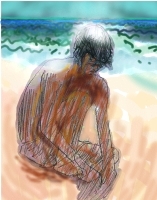Life's a beach
Saturday 6 August 2011
 You can find all human life on a beach. And what is more, if you take your lounging seriously, you have the time to watch and think and watch again …
You can find all human life on a beach. And what is more, if you take your lounging seriously, you have the time to watch and think and watch again …
It's amazing how flexible small children are. Take this one … shock of bleached hair, chin on his little brown knees, all balled-up, the better to concentrate on digging a hole in the wet sand. Fascinating stuff, wet sand – you can scoop it up, let it slither through your fingers, pat it down, smooth it out. His whole attention is caught by this basic primal mix of sand and water. I wonder if this is an absolute constant about young humans … if twenty thousand years ago, on this very beach, some stone-age child was in exactly the same position, doing exactly the same things? Very probably.
Would there be differences? His hair would be longer, since nobody would have bothered cutting it. Come to think of it – could you cut hair in the Stone Age ? You could bash the ends off with a couple of stones, I suppose, or try a high-tech solution with chipped flints … but who would waste the time? Length of hair doesn't have much to do with survival.
And what would our stone-age kid be doing on the beach, anyway? Did holidays exist? He'd probably be there with the rest of the family, or the collection of families from the home cave, as part of an expedition to find mussels, or go fishing, or look for shells to act as scrapers – or even jewellery? So I would imagine that 'holidays' didn't exist, as such, but that necessary, useful activity and pleasant, relaxing activity all intermingled promiscuously. Our kid would most likely have been obediently looking around for THAT sort of shell, and then just got delightfully distracted by the lovely squishy sand.
Here comes his mother. Now what happens? Does she give him a clip around the ear, and tell him to get back to looking for THAT sort of shell because, look, the sun's started to go down, and it's a long walk back to the cave, and he doesn't want to be out in the dark in that scary forest, does he ? Or does she squat down beside him, and agree that the sand is lovely, and show him how to make funny shapes with dribbled sand? Which raises the question: has maternal instinct changed?
You would think that playing with your child was an absolute basic, for all sorts of sound evolutionary reasons – play as nature's system of education, for instance. But does his mother have the time? Today, with all those shells to gather, and the question of food to sort out (have the men actually caught some fish for once?), and her other five children to take care of? Not only that, but she's twenty two, and she's pregnant again, and she knows that there are now only four other women in the cave that are older than her since the Old One died, and that her turn to go into the dark is coming … Or does she bother with any of those grim thoughts that come to her at times, but rather simply enjoys the sun and the sea and the wind and her son all balled-up so flexibly, with his lovely smile?
'Life's a beach', she thinks, anticipating a punning T-shirt by about 20,000 years, 'Life's a beach, and then you die'.
Handout: Life's a beach ... this blog is available as a student handout

